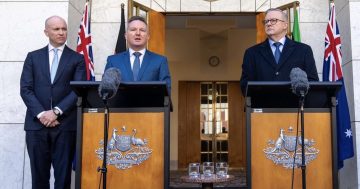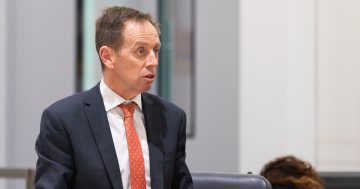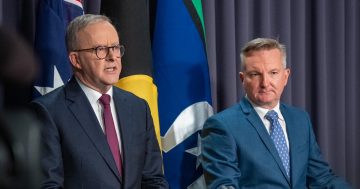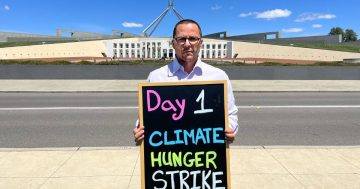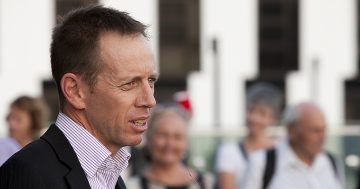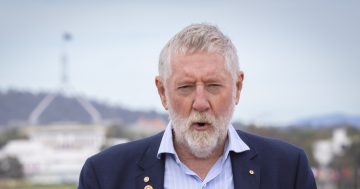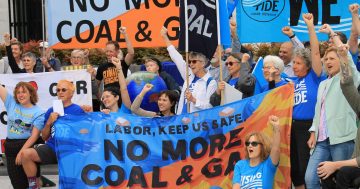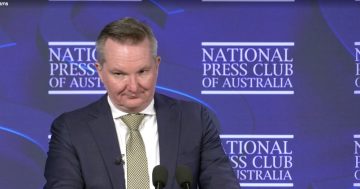
ACT Greens candidate Tim Hollo. Photo: Supplied.
Climate change is the defining issue of our times – and, finally, it will be the defining issue of this election. It is far and away the number one issue voters are raising in Canberra.
The central challenge is for the parties who accept the reality of climate change to work together maturely to deliver long-lasting action – and only those parties. The siren song of “bipartisanship” can cause serious problems on issues such as this.
There has never been a more crucial time for Labor and the Greens to unite to keep the blockers in the Coalition out.
Real, lasting breakthroughs come when parties which broadly agree on direction work together well. Here in the ACT, think of light rail, pill testing and our world-leading climate action. In each of these cases, the Greens advocated strongly and worked constructively with a cooperative Labor party to deliver major policy change. The ACT Government isn’t delivering Green policies across the board, but it’s more progressive because the parties are cooperating.
After this federal election, it will be vital for Greens and Labor to work together, as it’s mathematically impossible for Labor to secure a Senate majority. A Shorten government will have to choose between working in the Senate with the Greens or with the Liberals. And, given the rise of climate-focused independents and Greens challenging in seats as diverse as Canberra, Kooyong, Higgins, Brisbane, Warringah and New England, they may need to cooperate in the House again.
Labor has come a fair way on climate change. People like Mark Butler and Ged Kearney clearly understand the urgency, but others, pushed around by fossil fuel donors, are pulling them in the opposite direction. Their renewable energy target is stuck below business-as-usual. Bill Shorten’s refusal to give an unequivocal answer on Adani is emblematic. But his announcement this week that Labor would subsidise the expansion of fracked gas across northern Australia to the tune of $1.5 billion is a climate disaster in the making.
The Greens have a comprehensive science-based climate policy platform, centred around a ten-year transition from coal and gas to renewables. We have proposed an indicative timeline to close every coal power station, and regulatory measures to reduce coal exports down to zero by 2030. We have a suite of policies to expand renewable energy to power not just the whole country but also an export hydrogen industry. We will protect carbon in our forests and landscape, we will accelerate the shift to electric vehicles, and we will support workers through the transition.
This whole plan won’t be adopted in the next term of parliament. But putting it forward is the only way we’ll get near it. And we stand ready to work cooperatively, and with determination, with an incoming Shorten government to ensure that the next parliament puts Australia on the right path.
The thick of an election campaign may not be the easiest time for Labor to guarantee that they will work with the Greens. Importantly, an agreement to cooperate does not mean that each party should hold back from critiquing each other’s policies. But it’s possible to express that critique in the context of jointly ensuring that people who bring lumps of coal into the parliament should not be involved in developing climate policy. That’s why Bill Shorten’s rejection – so far – of cooperation with the Greens is so troubling.
Canberrans are rightly concerned about a repetition of the 2009 debacle. Nobody left that period covered in glory. But the central responsibility lies in Kevin Rudd’s declaration that he would never negotiate climate policy with the Greens, and would instead work with the Coalition’s Ian Macfarlane, who proudly saw himself as working on behalf of the fossil fuel industry.
What too often gets erased, however, is what followed. With more Greens in parliament than ever before, and with Kevin Rudd replaced by Julia Gillard – a leader who understood negotiation – Christine Milne proposed the Multi Party Climate Change Committee. The Committee brought the parties and independents who wanted climate action together around the negotiating table, joined by expert advisers, to nut out the policy. While the carbon price is gone, the Greens’ proposals of the Clean Energy Finance Corporation and the Australian Renewable Energy Agency continue to drive the expansion of renewables.
Getting to this outcome took both parties pledging to negotiate. It took maturity and a willingness to move. It took a powerful civil society movement outside parliament demanding real action. And it took sidelining the Liberal blockers who were never going to move.
Australia faces three challenges. The first is to decisively remove from power those who refuse to act on the climate emergency. The next challenge is to ensure that there are enough Greens in the parliament to pull Labor in the right direction. Most crucially, those outside parliament must make their voices heard loud and clear, demanding that Labor and the Greens work together to deliver the strongest possible action.
I pledge to play my part in that. If the people of Canberra send me to parliament, I will work with Labor to achieve the best outcome we can get. If not, I will stand outside with the community and demand it. I hope Labor can say the same.
Tim Hollo is Executive Director of the Green Institute and the ACT Greens candidate for the seat of Canberra.
Disclaimer: The views and opinions expressed in this article are those of the author’s and do not reflect the position of Region Media.
Region Media’s election coverage policy can be found here.












